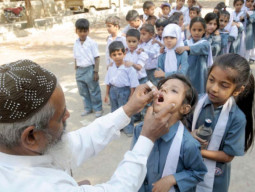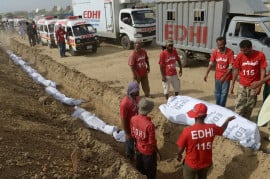
KARACHI:
Dissatisfied with the Sindh government's report on efforts to prevent infants' deaths in the drought-hit Tharparkar district, the Supreme Court (SC) called on Thursday complete details about the availability of medicines at government-run hospitals across the province.
A three-member bench, headed by Justice Amir Hani Muslim, was conducting suo motu proceedings regarding the deaths since the drought struck the district last year.
The then chief justice, Tassaduq Hussain Jillani, had taken notice of the media reports regarding deaths of over 100 children in Tharparkar. Former CJ Iftikhar Muhammad Chaudhry had also addressed a letter to Justice Gillani requesting to initiate suo motu proceedings into the deaths and migration of over 150,000 families from the affected areas.
Read: Public-private partnership: Sindh govt to hand over 50 hospitals to NGOs this week

On Thursday, the health secretary filed a report on the provision of health facilities to the children and families in the areas affected by the drought. The report stated that 161 children had died in the district during the last three years. Around 65 of these were suffering from pneumonia and 96 were affected by diarrhoea.
The secretary maintained that 10,018 malnourished children were treated at public hospitals in 2013 and 20,192 in 2014. This year, 10,338 such children have been treated so far. He said that 23,106 children affected by pneumonia were treated in 2013 and 36,289 in 2014. This year, 21,328 children have been treated so far. Similarly, 24,297 children suffering from diarrhoea were attended in 2013 and 41,528 in 2014. This year, 23,356 have been attended so far.
The secretary maintained that 49 out of the 785 children suffering from pneumonia, who had visited the out-patient services at the government hospital in Thar in 2013, had died.
Of 2,685 children attended in 2014, 11 had died from this disease in 2014. This year, five out of the 1,505 children who were attended to at the OPD, died.
Read: Misplaced priorities: Preventive care finds little space in health budget
The bench members expressed dissatisfaction over the report, observing it was meant to allure the court. Justice Amir Hani Muslim, who headed the bench, remarked that the government hospitals in district Tharparkar lacked both medicines and medical staff.
Another bench member, Justice Maqbool Baqar, inquired from the health secretary if he had ever visited the Jinnah Postgraduate Medical Center (JPMC) where stagnant sewage water had not been cleaned for years.
To further the knowledge of the officer, the judge added that conditions at the government hospitals were so bad that citizens did not go there for mere dressing of injuries. The bench members observed that the government had not even bothered to provide Kafan or land for the burial of the hundreds of victims, who had died from heatstroke during the heat wave in Karachi.
"The victims' bodies would have been decomposing on the streets had it not been for the likes of Abdul Sattar Edhi who helped them," Justice Muslim remarked, addressing the health secretary.
The three judges directed the health secretary to submit complete details, including the finances and medicines, provided at the government-run hospitals across the province.
Published in The Express Tribune, July 31st, 2015.




















































COMMENTS (1)
Comments are moderated and generally will be posted if they are on-topic and not abusive.
For more information, please see our Comments FAQ